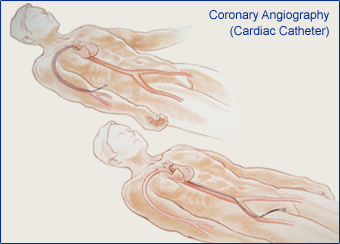Cardiac Procedures
Coronary Angiography
A coronary angiogram is carried out under a local anesthetic, usually via the groin. A long hollow plastic tube is inserted and guided back through your arteries under x-ray monitoring. X-ray contrast (i.e. fluid which stands out on x-ray but is harmless to you) is injected into the coronary arteries and any narrowings (stenoses) in the artery can be seen. The number and severity of these stenoses can be assessed and the need for further treatment determined. The test also provides information on the pressure inside the heart and show how well the heart is working as a pump.

The hospital will ask you not to eat or drink anything for a few hours before the procedure. If you are diabetic you will be asked to stop Metformin for 2 days starting from the day of the test.
You will be admitted to the ward a couple of hours prior to the test in order to check all the details prior to the test. You will then be escorted to the cath lab.
The procedure takes approx 30 minutes. During the test you may experience a warm glow and a sensation as if you have 'wet' yourself. This is due to the x-ray contrast and usually only occurs once and lasts approx 30 seconds. Your heart and ECG will be monitored continually during the test. At the end of the test the nurse or doctor will press on the arterial puncture site for 10 minutes to stop any bleeding. An alternative method is for an angioseal plug to be deployed which rapidly seals the arterial puncture site. It can not be used in every patient for technical reasons.
You should tell a member of staff if at any time during the procedure you feel unwell or experience any discomfort.
You will be asked to remain in bed for up to 6 hours depending on the method of sealing the arterial puncture. Most patients will be allowed home the same day. Your doctor may want you to stay in hospital longer depending on the result and your condition.
Bruising developing around the groin and the area is not uncommon. It may be tender for a few days. You should feel back to normal within a few days. If you have any concerns you should contact your doctor.
We are all at risk every time we go out either as a pedestrian or a passenger in a car, train or aeroplane and usually we accept this as part of daily living.
A coronary angiogram is rarely associated with serious complications. There is a 1 in 1000 risk of having a heart attack; stroke or dying the risk varies depending on your overall health and your individual heart condition. The test will only be recommended if the potential benefits outweigh the risks. The risk from significant narrowing of the coronary arteries approaches 6% per annum.

